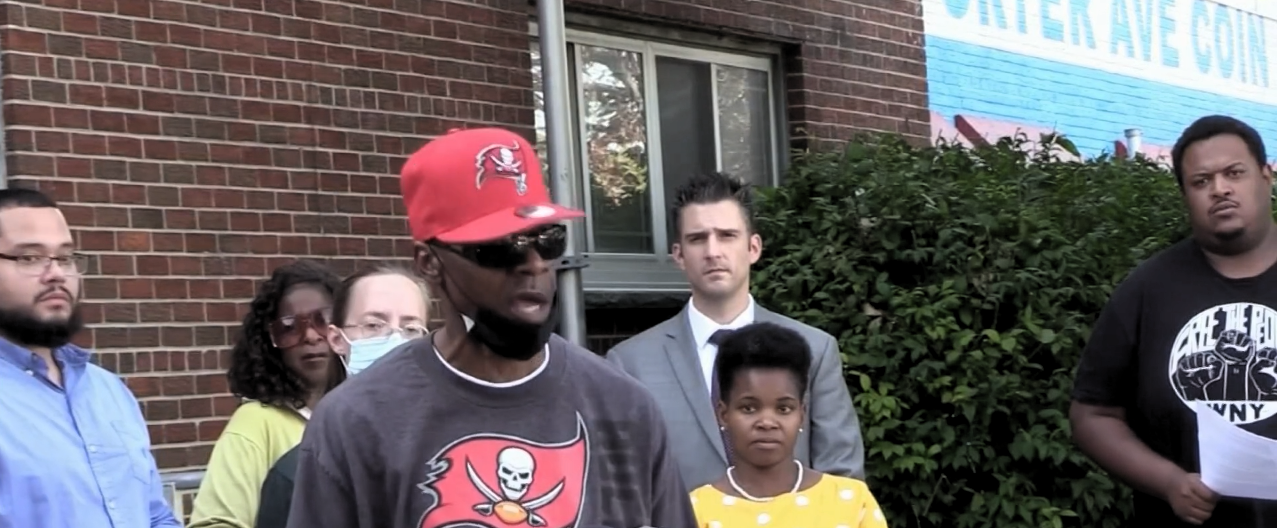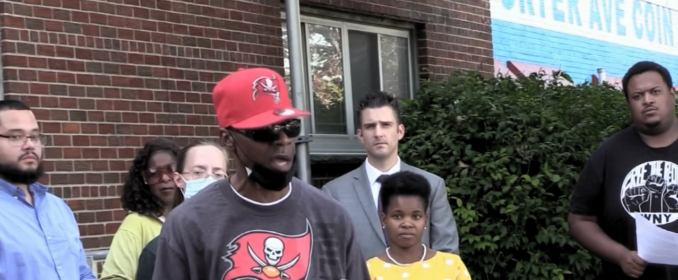

Tenants and organizers from Queen City Workers' Center, along with progressive Buffalo mayoral candidate India Walton, gather for an Oct. 11 press conference in front of Peace Bridge Apartments, Buffalo, N.Y.
By Hadley Willow
Since late August, tenants at the Peace Bridge Apartments building have been organizing mounting resistance against Porter Avenue Acquisitions and Power Play Partners – real estate developers that plan to convert the building into “quality green housing that is kept at a high standard.”


Tenants and organizers from Queen City Workers’ Center, along with progressive Buffalo mayoral candidate India Walton, gather for an Oct. 11 press conference in front of Peace Bridge Apartments, Buffalo, N.Y.
In the age of late-stage capitalism these are the duplicitous words of a ruling class that exploits the environment in pursuit of profit to the detriment of our species, while simultaneously using the language of environmentalism to justify casting people out into the cold streets.
The tenants at 111 Porter Avenue more than agree that the building is in need of renovation, with frequent reports of mold, mice and roaches. But this process should take place with the current tenants as its primary focus. Instead, tenants received a non-renewal of lease notice from someone named “JP” who, according to the letter, is the new property manager.
Publicly, the company has claimed to have contacted each tenant individually. In reality, its interaction with tenants has been distant and impersonal, adding to their frustration. As Michael, a tenant for 24 years, aptly points out, “This is part of a national movement of gentrification … to get rid of certain people and displace them.”
Many of the tenants are older, many have disabilities, and many receive rental assistance, which makes displacing them during an ongoing pandemic particularly cruel and harmful. But for the ruling class, vulnerability means merely an easier pursuit of profit, not a cause for humane intervention.
It is well known that stress negatively impacts physical and mental health. Though the final eviction of tenants from Peace Bridge Apartments is scheduled for Nov. 30, this decision has already impacted with extreme stress the lives of many tenants.
One tenant, Randy, who had lived there for 27 years, recently died, and his family and friends blame his death on this terrible situation. According to them, he was perfectly healthy two months ago before the eviction process began. Another tenant recently had a stroke after being forced to leave. Michael has noted that it’s hard to sleep and he’s constantly worried.
The eviction dates ranged from 30 to 90 days, and supposedly depends on how long each tenant has lived there. But according to tenants, this procedure has not been followed. In addition, many eviction dates were seemingly arbitrary. Some tenants suspect these dates have more to do with how diligently they had paid their rent than with seniority.
Adding to property owner duplicity, letters were sent out offering tenants $1,000 to move out on the designated date of their eviction. But in the fine print, the letters stated that this payment would include their security deposit, an amount which the owners are already legally required to pay back.
Tenants who took this offer have not received any money, not even their security deposit, which is vital to find new housing, especially for people who live on a fixed income.
When a community struggles together
Even before this struggle, the tenants at the Peace Bridge Apartments building had formed a strong community – which has been a support in this struggle against the owning class, who would rather have workers and oppressed people stay isolated and thus more easily exploited. Tenants gathered together frequently for meals at Burger King across the street from the apartments – a tradition that still continues, now as a form of organizing rather than a social event.
Activists at Queen City Workers Center have been working closely with tenants to hold weekly meetings at that location where people share stories and discuss ways to resist the eviction. Mary, a member of QCWC, explains, “Our approach has been two-pronged: to build public dissent, and to use the state to challenge the landlord.”
Organizers started by putting up fliers around the building to attract tenants to meetings, and tenants made an effort to speak with neighbors who were reluctant to get involved. Stories at these meetings were distributed to local news outlets, radio shows and activist organizations. The tenants’ demands were distributed to the public in the form of leaflets.
The second part of the organizing approach was accomplished by reaching out to a local Section 8 provider, who put pressure on the landlord to extend the eviction dates. Assistance was also given in filing paperwork for extensions, emergency rental assistance and requests for accommodation. Organizers also contacted local officials, including Buffalo’s Director of Policy Robert Mayer as well as the head of the Municipal Housing Authority.
The Peace Bridge Apartments tenant resistance highlights the importance of community involvement as a buffer against exploitation by the ruling class. Communities that interact regularly and where community members know each other by name are easier to organize. When a community struggles together, this familiarity transforms into solidarity.
Workers need our own apparatus for confronting these attacks on our class, systems of our own that are disconnected from bourgeois profit motive and controlled by working-class people. Each struggle we take up is a short-term investment in the immediate rights of our class and a long-term investment in the power and strength of our ability to organize.
The epic struggle of the Palestinian people against the full weight of U.S. imperialism and…
The following report comes from the Bronx Anti-War Coalition organizers on a protest held in…
In the Canadian federal elections held on April 28, the Liberals won with 169 seats…
The following is Part 2 of a talk given by the author to a meeting…
Boston Students, professors and workers are confronting the Trump administration’s fascist crackdown at universities across…
Philadelphia Within days of Swarthmore students reviving a pro-Palestinian encampment on April 30, police arrested…